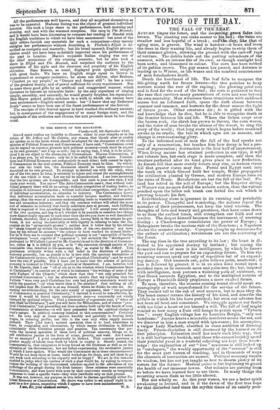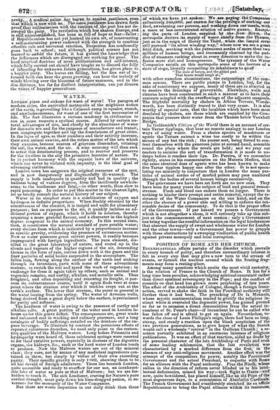TOPICS OF THE DAY.
THE FALL OF THE.LEAF.
AUTUMN tinges the forest, and the deepening, pee. fadea into brown. The slanting sun sinks sooner to his bed v-aliarnti are steadier and less hopeful of a break ; ancrtie.ithigj, .41* of aginc, man, is graver. The wind is harsher—it beats and tears the trees in their waning life, and already begins to strip them of their summer glories, strewing the ground with the cast-off rags of verdure. The dahlia holds out the parting splendours of the summer, with an intense fire of its own, as though sunlight had been sown, and blossomed in colour. The corn has been robbed of its golden crown. The gay season has passed, and Autumn is leading us to Winter' as life wanes and the sombred countenance of man foreshadows death.
Death the handmaid of life. The leaf falls to compose the life-giving earth for future forests—the tree perishes to heap nurture round the root of the sapling ; the glowing petal rots i and is food for the seed of the bud ; the corn s gathered to feed the race that survives many generations of corn and sees beyond its own mortality. Man witnesses these transitions with saddened senses but an informed faith, spans the dark chasm between summer and summer, and borrows for the drear season the light of future years. Other creatures die ; he is gifted with the sad knowledge that he dies, but he is able to recognize death as the frontier between life and life. Where the lichen crept over the barren rock, the shrub has grown to forests, the corn waves, and the voice of man breaks the silence of the desert, to sing the story of the world ; that long story which began before mankind awoke in its cradle, the tale in which ages are as seasons, and change is ever-increasing glory. To the informed soul of man the fall of the leaf speaks not only of a resurrection, but teaches him how decay is but a pro- cess of regeneration ; destruction is the first half of improvement. When living nature has attained perfection in one type, it will not tolerate less, but each stage is made complete, and then the creature perfected after its kind gives place to new perfection. As forests fall that more stately forests may rise' so human states fall that greater states may rise. Persia and Egypt sank into the tomb on which Greece built her temple, Rome propagated the civilization planted by Greece, and modern Europe rises on the ruins of Rome. Revolutions are but the fall of the leaf. Po- land has rotted in the soil of Europe; but the Emperor sitting at Warsaw can no more forbid the unborn nation, than the vulture perched upon the fallen oak trunk can forbid the oak which is growing beneath his feet. Evil-thinking alone is ignorant in its cunning and perishable in its power. Changeful and wandering, the nations repeal the mistakes of their predecessors, but keep the tried wisdom. The thoughts of love and beauty and greatness, that have come down to us from the earliest times, still strengthen our faith and our resolve. The despot himself becomes the instrument of unerring destiny : a Charlemagne consolidates the power of Europe ; a Robespierre breaks the noxious rule of the Buurbons; a Napoleon chains the monster anarchy. Conquest ploughs up dominions for the culture of civilization ; revolutions are but the scattering of the forest.
The sap rises in the tree according to its law ; the beast is di-
rected to his appointed destiny by instinct but among the formative forces of man is his intelligence, instinct; which he knows the past and can so prepare for an expanding future. To him the recurring seasons speak not only of repetition but of an expand- ing destiny. Oak succeeds oak, palm follows palm, unaltered ; if less is followed by greater, it is in an alien kind rooted upon a perished race, as fir succeeds moss and palm-tree fir; but, inspired with intelligence, man pursues a widening path of existence, so that Greek succeeds Egyptian, and to the multiplied nations of Europe a Humboldt dimly prophesies a more exalted future. To man, therefore, the seasons coining round should speak en- couragingly of work unperformed for the service of the future. They cannot tell to the oak of seed unsown, but to man they do. The beast cannot retrace the history of his kind, and describe the pitfalls in which his kin have perished; but even our advance has not been all level and consistent. We struggle against our faults with too faint a heart or too biassed a will. The fall of leaf might remind us how many a fruit still hangs to perish upon "Tyburn tree ": every English village has its Lucrezia Borgia, "only not handsome.' Justice hunts a miserable murderer across the sea, and we discover in him a man stupid with ignorance; his accomplice, a vulgar Lady Macbeth, absorbed in some ambition of dressing finely. Prison-discipline is still discussed by the learned on its first principles. Education itself has made such little way, that it is still barbarously bookish, and those who cannot lavishly spend their youthful years in a wasteful schooling are kept from know- ledge: the explanation of our " free" museums is still locked up in catalogues," the weekly opportunity of the "sermon" is still for the most part barren of teaching, and in thousands of ways the channels of instruction are unused. Political economy vaunts its wisdom, but has not yet taught us how to disarm plenty of its terrors for the farmer. Medical police is but beginning to guard the health of our immense towns. Our colonies are passing from us before we have learned how to use them. In many things the recurring season finds us too little altered. But not wholly so. As this year wanes, we see a better spirit awakening in Ireland, and in it the dawn of the first true hope for that disturbed land since the mythic times of its saintly pros- PeriVO ffMcliC ROT. ingiftgrIth , '4WD VAR: that w now with us.. , a,a4tptent gene& eitc,%1POla proot. utilitarianism with. e _van tato sth.e:past as.timf t!*-, stroye e piety. T e Whit 'has.shaken Europe _and. is a y.inccoinpislaea has been as,,fu,,of hope 'as fear—fu ler if Republicanism has not yet learnefilkawn art, of constructing. a selkoaintaining power endowed with the strength to combine effective rule and universal 'sanction, Despotism has confessedly gone back to school ; and although.political science has not learned to unfold the future, it h* gained the knowledge that the intluenees which are disengaged are wOrking for good. The hard sceptical doctrine' of mere utilitarianisni and self-interest,' which fully carried entshould have taught us to discard the folly of labouring for unknown,futurogeiaerations,,has given place to, a hapPier piety. The leaves are filling, but the fine ear of in- formed faith, can bear the grass,growing, can hear the melody of winds blowing over the blossoms of future'. summers, and in the dim distance, too far for 'distinct interpretation, can yet discern
the voices of happier generations.



























 Previous page
Previous page